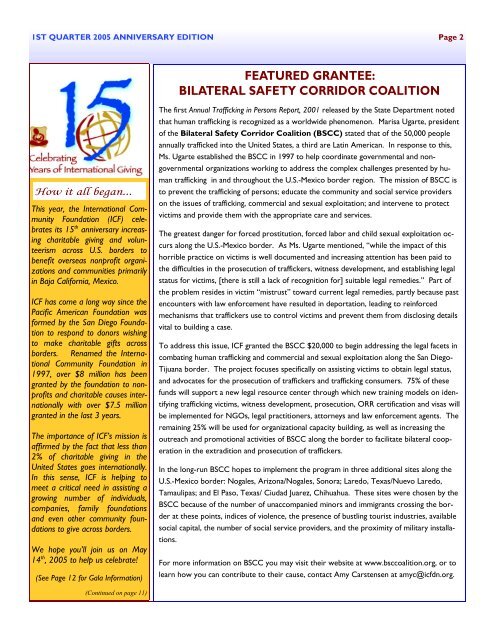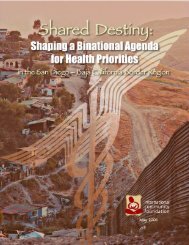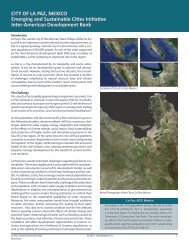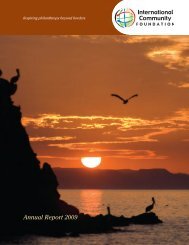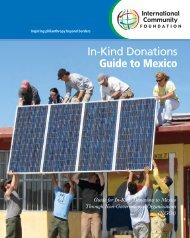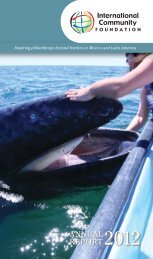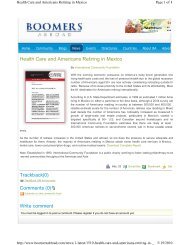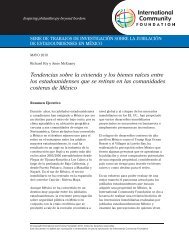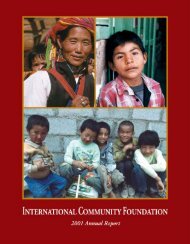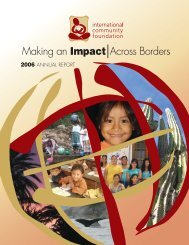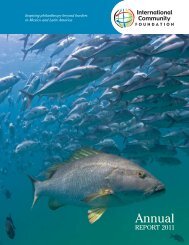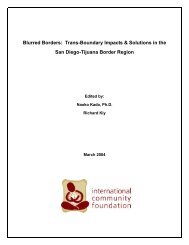1st quarter 2005.pub - International Community Foundation
1st quarter 2005.pub - International Community Foundation
1st quarter 2005.pub - International Community Foundation
- TAGS
- www.icfdn.org
Create successful ePaper yourself
Turn your PDF publications into a flip-book with our unique Google optimized e-Paper software.
1ST QUARTER 2005 ANNIVERSARY EDITION<br />
How it all began...<br />
This year, the <strong>International</strong> <strong>Community</strong><br />
<strong>Foundation</strong> (ICF) celebrates<br />
its 15 th anniversary increasing<br />
charitable giving and volunteerism<br />
across U.S. borders to<br />
benefit overseas nonprofit organizations<br />
and communities primarily<br />
in Baja California, Mexico.<br />
ICF has come a long way since the<br />
Pacific American <strong>Foundation</strong> was<br />
formed by the San Diego <strong>Foundation</strong><br />
to respond to donors wishing<br />
to make charitable gifts across<br />
borders. Renamed the <strong>International</strong><br />
<strong>Community</strong> <strong>Foundation</strong> in<br />
1997, over $8 million has been<br />
granted by the foundation to nonprofits<br />
and charitable causes internationally<br />
with over $7.5 million<br />
granted in the last 3 years.<br />
The importance of ICF’s mission is<br />
affirmed by the fact that less than<br />
2% of charitable giving in the<br />
United States goes internationally.<br />
In this sense, ICF is helping to<br />
meet a critical need in assisting a<br />
growing number of individuals,<br />
companies, family foundations<br />
and even other community foundations<br />
to give across borders.<br />
We hope you’ll join us on May<br />
14 th , 2005 to help us celebrate!<br />
(See Page 12 for Gala Information)<br />
(Continued on page 11)<br />
FEATURED GRANTEE:<br />
BILATERAL SAFETY CORRIDOR COALITION<br />
Page 2<br />
The first Annual Trafficking in Persons Report, 2001 released by the State Department noted<br />
that human trafficking is recognized as a worldwide phenomenon. Marisa Ugarte, president<br />
of the Bilateral Safety Corridor Coalition (BSCC) stated that of the 50,000 people<br />
annually trafficked into the United States, a third are Latin American. In response to this,<br />
Ms. Ugarte established the BSCC in 1997 to help coordinate governmental and nongovernmental<br />
organizations working to address the complex challenges presented by human<br />
trafficking in and throughout the U.S.-Mexico border region. The mission of BSCC is<br />
to prevent the trafficking of persons; educate the community and social service providers<br />
on the issues of trafficking, commercial and sexual exploitation; and intervene to protect<br />
victims and provide them with the appropriate care and services.<br />
The greatest danger for forced prostitution, forced labor and child sexual exploitation occurs<br />
along the U.S.-Mexico border. As Ms. Ugarte mentioned, “while the impact of this<br />
horrible practice on victims is well documented and increasing attention has been paid to<br />
the difficulties in the prosecution of traffickers, witness development, and establishing legal<br />
status for victims, [there is still a lack of recognition for] suitable legal remedies.” Part of<br />
the problem resides in victim “mistrust” toward current legal remedies, partly because past<br />
encounters with law enforcement have resulted in deportation, leading to reinforced<br />
mechanisms that traffickers use to control victims and prevent them from disclosing details<br />
vital to building a case.<br />
To address this issue, ICF granted the BSCC $20,000 to begin addressing the legal facets in<br />
combating human trafficking and commercial and sexual exploitation along the San Diego-<br />
Tijuana border. The project focuses specifically on assisting victims to obtain legal status,<br />
and advocates for the prosecution of traffickers and trafficking consumers. 75% of these<br />
funds will support a new legal resource center through which new training models on identifying<br />
trafficking victims, witness development, prosecution, ORR certification and visas will<br />
be implemented for NGOs, legal practitioners, attorneys and law enforcement agents. The<br />
remaining 25% will be used for organizational capacity building, as well as increasing the<br />
outreach and promotional activities of BSCC along the border to facilitate bilateral cooperation<br />
in the extradition and prosecution of traffickers.<br />
In the long-run BSCC hopes to implement the program in three additional sites along the<br />
U.S.-Mexico border: Nogales, Arizona/Nogales, Sonora; Laredo, Texas/Nuevo Laredo,<br />
Tamaulipas; and El Paso, Texas/ Ciudad Juarez, Chihuahua. These sites were chosen by the<br />
BSCC because of the number of unaccompanied minors and immigrants crossing the border<br />
at these points, indices of violence, the presence of bustling tourist industries, available<br />
social capital, the number of social service providers, and the proximity of military installations.<br />
For more information on BSCC you may visit their website at www.bsccoalition.org, or to<br />
learn how you can contribute to their cause, contact Amy Carstensen at amyc@icfdn.org.


